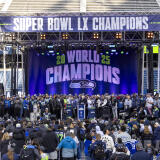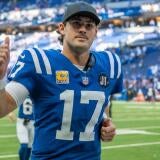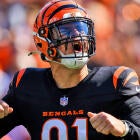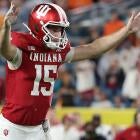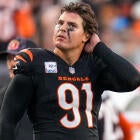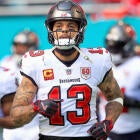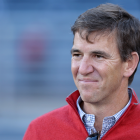Agent's Take: Inside look at the consequences and dynamics facing Nick Bosa, Zack Martin and other holdouts
Some players can force a team's hand, while others hold little leverage

Training camp holdouts by players under contract were thought to largely be a thing of the past because of more severe penalties in the 2020 NFL collective bargaining agreement. The "hold-in" started becoming the predominant method for players to try to get contract unhappiness addressed because of the harsh economic consequences of a holdout.
A player will report to training camp but won't practice or have limited participation in an effort to get a new contract. For instance, Steelers edge rusher T.J. Watt was essentially a spectator during Pittsburgh's training camp and preseason practices in 2021 until a few days before the regular-season opener when he became the NFL's highest-paid non-quarterback.
Holding out has made a comeback this year. Three players under contract -- 49ers edge rusher Nick Bosa, Chiefs defensive tackle Chris Jones and Cowboys offensive guard Zack Martin -- didn't report to training camp on time. Raiders running back Josh Jacobs, who designated as a franchise player, is also having a contract-related absence.
As an agent, I was involved in two lengthy holdouts with wide receivers Jimmy Smith and Keenan McCardell. Smith held out for 38 days in 2002 before getting a new contract from the Jaguars at the end of the preseason. McCardell's dispute with the Buccaneers in 2004 lasted 82 days, which resulted in him being dealt to the Chargers right before the trading deadline. My experiences give me a certain appreciation about contract disputes.
Holdout penalties
Players on veteran contracts, like Jones and Martin, are subject to a $50,000 fine for each day of training camp missed. This daily fine is mandatory and can't be reduced or rescinded when signing a contract as a veteran player. For CBA fining purposes, training camp runs from the mandatory reporting date through the Sunday before the first regular-season game (Sept. 3).
A player who signed his contract as an unrestricted free agent is also fined one week's base salary (1/18th of salary) for each preseason game missed in addition to the $50,000 per day. This penalty doesn't apply to Jones or Martin. Jones signed his four-year, $80 million contract, worth up to $85 million through incentives, in 2020 as a franchise player. Martin signed a six-year, $84 million contract extension, averaging $14 million per year, in 2018 that made him the NFL's highest-paid offensive guard. He has two years left on his contract.
The CBA mandates a slightly different consequence for first-round picks holding out when playing under a fifth-year option, like Bosa. It's a fine up to $40,000 per day and the weekly salary penalty applies. Since Bosa's fifth-year option is a fully guaranteed $17.859 million, one week's salary is $992,167.
The 49ers have the ability to waive or reduce any fines since Bosa is still on his rookie contract. The indication is the fines won't be enforced with Bosa.
The financial penalties don't apply to unsigned draft picks, and players with restricted free agent, franchise or transition tenders who aren't under contract who miss training camp. Their attendance isn't required because of the absence of a signed contract. Jacobs falls into this category. As an unsigned player, Jacobs isn't withholding services he is contractually obligated to perform.
A team can also recover a portion of a player's signing bonus. For example, 15% of the prorated amount of signing bonus can be recouped beginning on the sixth day of a training camp holdout. It's 1% for each additional missed day with a maximum of 25% of the prorated amount during training camp. An additional 25% can be recovered with the first missed regular-season game. After four missed weeks in the regular season, a team can recover 1/18th of the prorated amount for each additional week of the player's absence. The maximum a team can recover in a season is the entire prorated amount of the player's signing bonus in that contract year.
Bosa's signing bonus with his rookie contract was prorated through the original four years (2019 through 2022). Recoupment isn't applicable to Bosa because his fifth-year option payment is base salary where there isn't any proration.
Bonus forfeiture isn't an issue with Jones. His 2020 contract didn't contain a signing bonus. When Jones converted a $20 million roster bonus into signing bonus in 2021 for salary cap purposes, recovery of the money by the Chiefs was only for a contract breach or default during that year. After 2021, the Chiefs haven't been entitled to recoup any of the $20 million because of Jones' conduct or failure to perform contractual obligations.
Martin should be in the same position as Jones since the proration from the $20 million signing bonus he got in his 2018 extension ran through 2022. None of the $20 million can be recouped.
Unfortunately for Martin, the recoupment language in his four contract restructures over each of the last four years (2020 through 2023) differs from Jones' language with his 2021 restructure. Jones' language is the norm around the NFL where recovery of signing bonus is limited to that particular year when a simple contract restructure, like he and Martin have done, occurs.
Cowboys contracts have broad language where recoupment rights continue until the proration runs out as was the case with Martin's $20 million signing bonus. The lone exception is quarterback Dak Prescott's contract that has been restructured three times since he signed in 2021. Dallas doesn't have the ability to get back any of the money Prescott turned into signing bonus for cap purposes beyond the year the salary conversion takes place.
Martin gave the Cowboys rights of recovery to the $41.4 million converted from base salary to signing bonus in the four restructures. If the money had remained as base salary, there wouldn't be any recovery rights. The CBA prevents teams from recovering base salary after it has been paid.
The combined $9.34 million of 2023 signing bonus proration from the four restructures is potentially at risk. Martin could soon be out $2.335 million in addition to the daily $50,000 fine. The maximum 25% that can be recovered from Martin's combined 2023 signing bonus proration in a holdout that doesn't extend into the regular season is $2.335 million. Recoupment of signing bonus in a holdout is at a team's discretion.
Leverage
Players need to objectively assess their leverage and understand the risks and potential ramifications before engaging in a holdout. When we had a client contemplating holding out, we would arrange conversations between him and other clients we had who considered holding out or been through one and recommend that he speak with another NFL player he knew well that had been faced with the same decision.
McCardell had extensive conversations with Smith before making his decision. We knew Smith would be candid about his experience since he and McCardell were good friends and teammates in Jacksonville for six years.
We would attempt to gauge the client's level of commitment beforehand by detailing the worst-case scenarios with his potential holdout since some players don't have the attitude or mindset for a lengthy holdout. The client would be given his team's history with holdouts. We would also provide him a league-wide analysis of holdouts over the last few years which included the success rate.
Martin surely factored Ezekiel Elliott's contract dispute in 2019 into the equation when making his decision about a holdout. The Cowboys caved in Elliott's 39-day holdout, which lasted until five days before Dallas' first regular-season game. Elliott received a six-year, $90 million extension when he had two years remaining on his rookie contract. The deal made Elliott the league's highest-paid running back at $15 million per year.
Cowboys owner Jerry Jones is taking a hardline stance with Martin. He apparently thinks he can wait Martin out because the severe financial penalties should deter a lengthy absence. Dallas' ability to recoup money that wouldn't be possible with most other teams is problematic for Martin.
Holdout dynamics
A holdout is ultimately a test of both sides' resolve. Once a player misses the beginning of training camp, there usually isn't much dialogue between a player's agent and the team early on when there is a contract impasse. Teams typically approach a holdout as if the player is injured, look for replacements at his position either internally or from available free agents and evaluate how the team performs with him absent.
Most holdouts don't mind missing the daily grind of training camp but as the regular season gets closer, a player may start having second thoughts about his decision. If meaningful dialogue on a new contract resumes, it may not be until the middle of the preseason.
There were hardly any conversations with the Buccaneers during most of McCardell's holdout because both sides were firmly entrenched in their positions. There wasn't significant movement in Smith's situation until a heated conference call between Jaguars contract negotiator Paul Vance, myself and Smith during the latter part of the preseason where the five-time Pro Bowler gave the organization a piece of his mind.
Bosa's and Jones' holdouts don't seem to be as contentious as the disputes where I was involved. In these two instances, the contract standoffs are fundamental disagreements on the players' value.
Niners general manager John Lynch characterized Bosa's deal as complex at the beginning of training camp. The complexity probably stems from Bosa's agent, WME Sports' Brian Ayrault, being a shrewd negotiator who drives a hard bargain.
Ayrault isn't a stranger to holdouts. He represents Joey Bosa, who is Nick's older brother. The elder Bosa engaged in the longest contract dispute for an incoming NFL player under the rookie wage scale in 2016. He missed 31 days before signing his contract.
Ayrault was also the lead negotiator for Rams interior defensive lineman Aaron Donald when he held out after his third and fourth NFL seasons in a quest for a new contract. Donald didn't report to the Rams, without a new deal, until right before the 2017 regular season started. Donald staged a second holdout in 2018 that lasted the entire preseason before he became the charter member of the $20 million-per-year non-quarterback club.
Ayrault is certainly looking to put the younger Bosa at the top of the defensive player pay scale like he did for his brother in 2020. That current distinction belongs to Donald. The three-time NFL Defensive Player of the Year signed a three-year, $95 million contract, averaging $31,666,667 per year, last June. Donald is also the league's highest-paid non-quarterback.
Jones is reportedly seeking $30 million per year. The Chiefs probably don't have a problem making Jones the NFL's second-highest-paid interior defensive lineman ahead of Quinnen Williams, who recently signed a four-year extension averaging $24 million per year. The gap between what Jones reportedly wants and the Williams deal is substantial.
Savvy teams will refrain from talking to the media about the player besides an obligatory statement about being unwilling to publicly comment on a player who isn't in training camp or that the player's contributions are valued and welcome him returning to the team when he is ready to honor his contract.
Both the 49ers and Chiefs have been careful not to make any statements that could antagonize Bosa and Jones. The 49ers have downplayed Bosa's absence because they trust his ability to prepare for the season while away from the team. For what it's worth, Donald was named NFL Defensive Player of the Year following each of his holdouts.
The Chiefs have been complimentary toward Jones in their rare public statements about the contract stalemate. General manager Brett Veach has stated that he doesn't have any intention of trading Jones.
A high-ranking front office team executive once told me that since holdouts usually are more personal to players, a team should never publicly embarrass or humiliate a player during the process no matter how illogical his position may seem to them because they'll have to deal with the fallout once he returns to the team if he doesn't get a new contract.
Team comments can give the agent or player an opening to start negotiating the contract in the media by making their position seem more equitable than the team's in an attempt to put public pressure on the team to give into their demands. Jones runs the risk of falling into this trap with Martin because of his loquaciousness. I would imagine Cowboys linebacker/edge rusher Micah Parsons privately doesn't like that the massive contract he is expected to receive as early as next offseason is being used as reason why Martin's contract can't be adjusted.
In most cases, fans don't take a player's side in a contract dispute with a team. The public doesn't relate to a player being unhappy with what is a lucrative contract in their eyes or rejecting a substantial offer. Unusual circumstances are required for public sentiment to be with the player.
We had those with Smith. Jaguars owner Wayne Weaver told Smith when he restructured his contract for cap purposes in 2001 that he would renegotiate his contract with another good season. Smith held up his end of the bargain. He caught 112 passes for 1,373 yards with eight touchdowns in 2001, which was better than what he did in 2000. When Smith asked Weaver after that season about the timing of negotiations, he denied having the previous conversation about his contract. Weaver reneging on his promise to Smith resonated with the Jaguars fan base. Smith was also aided by Jacksonville's first-team offense struggling to move the football without him (16 punts in 17 offensive possessions).
A major obstacle a player sometimes has to overcome is a team's concern about establishing a precedent of giving into a player's demands for a new contract through a holdout. Although teams should be able to easily make distinctions based on each player's particular circumstances, they don't want to send a signal to the other team members that they could get rewarded by holding the team hostage. This is especially the case when there is a new owner, or new general manager or new head coach with a hands-off owner.
The aspect of precedent isn't a concern with the Chiefs and 49ers. Jones seems to be trying to reverse the Elliott precedent of giving an extension when there are two years left on a contract after services are withheld with Martin.
Some teams have a philosophy that they won't have meaningful dialogue about a new contract with a player while he is a holdout. The Raiders didn't extend offensive tackle Donald Penn's contract in 2017 until he returned to the fold shortly after the second preseason game. Obviously, this isn't applicable to Bosa or Jones.
Other teams will take it a step further in sending a message to holdouts by rewarding players that attend team activities. The Steelers did this in 2012 by giving Antonio Brown a new deal while Mike Wallace held out.
Prominent players at impact positions have the best chance of success provided they remain patient and give the impression that they are willing to continue their absence into the regular season. Offensive guard isn't normally considered an impact position. Martin, a six-time first-team All-Pro, is arguably Dallas' best offensive player and the most important piece of the offensive line.
The longer a holdout drags on, the more of a distraction it can become with coaches and teammates being constantly asked about it by the media before and after games and practices. It also helps to be on playoff contenders/teams with Super Bowl aspirations or teams where the head coach or general manager is on the hot seat. Pressure may be put on ownership to do whatever it takes to get the player back into the fold as the regular season approaches.
The Cowboys could fall into this category. There is speculation that head coach Mike McCarthy might lose his job with Dallas taking a step backward from 2022's 12-5 record and not getting past the divisional playoffs again since Jones thinks he has a Super Bowl contender. This could be especially true if the offense falters since McCarthy has taken over play-calling duties after firing offensive coordinator Kellen Moore.
In holdouts where the team takes a hardline stance, it isn't uncommon for the player to eventually ask for a trade. It wouldn't be a surprise for Martin to eventually demand a trade if Jones continues to be unwilling to make any adjustments to his contract.
Watching how the Bengals and Patriots handled Trey Hendrickson and Matthew Judon's situations after outperforming their contracts with two years left has to be frustrating for Martin. Hendrickson was recently given a one-year extension worth $21 million although he had two years remaining on the four-year, $60 million deal he signed in 2021. Judon just got a $3 million raise for this season from $12 million to $15 million while his 2024 base salary decreased by the same amount. He can make a maximum of $18 million in 2023 because his incentives increased from $500,000 to $3 million. Judon's 2023 salary guarantee also went from $2 million to $14 million.
The team probably isn't going to disclose to a player trade inquiries or offers especially if they aren't interested in dealing him. The agent should ask the team for permission to shop his client to other teams so he isn't relying on the word of the team in assessing his client's potential trade market. A team may not give such permission but some teams won't be willing to have trade discussions with an agent without proof out of fear of having tampering charges filed against them. Some teams view trading a holdout as similar to giving the player a new contract where they are setting a precedent by rewarding negative behavior.
Deals for Bosa and Jones seem inevitable. In the grand scheme of things, it doesn't really matter when an agreement is reached as long as regular-season games aren't missed. Something will have to go seriously wrong for either of the two to play out their respective contracts this year.
It will be interesting to see whether Martin or the Cowboys blink first. If it's Martin, he should get assurances from the Cowboys that rights to recoup signing bonus from him won't be exercised before ending his holdout.


